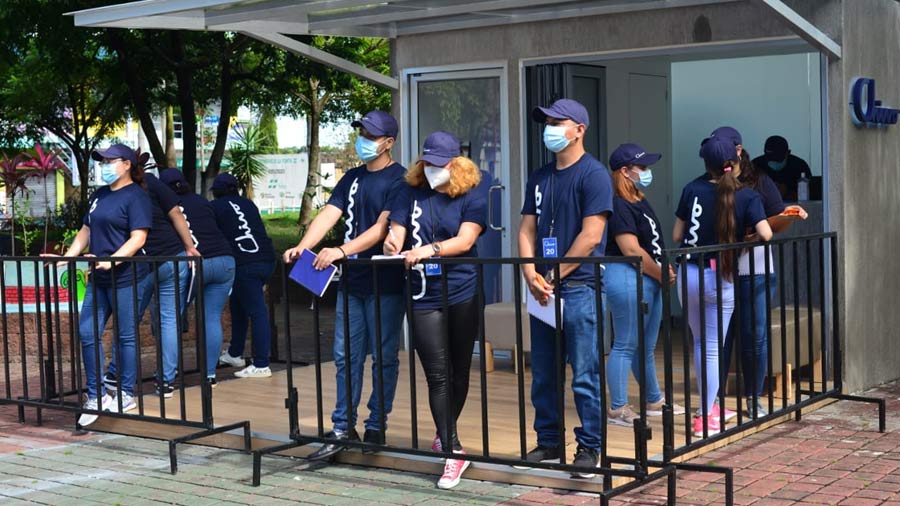
In 1999, CEL created a company which, less than a month ago, was only renamed Cabra, SA de CV, a company founded with funds from an “official official public service institution”.
On February 24, 1999, the Lempa River Executive Committee, CEL, and the Ahuachapán Electric Light Company, Variable Capital Corporation (CLIA, SA de CV), decided to found ETESAL, SA de CV (Company Transmitter of the Savior).
Less than 10 months after ETESAL was founded, this company and CEL founded the company Inversions El Salvador No. 1, which 22 years later has been renamed Chivo, Sociedad Anónima of variable capital.
Chivo is the company that is after the application of the same name, with which, from this Tuesday, September 7, Salvadorans who already use it can make transactions with the virtual currency Bitcoin, the implementation has been harshly rejected nationally and criticized internationally.
YOU CAN SEE: Portera Boc can share user data with companies
Thus, Chivo, SA de CV is the new name of the company Inversions El Salvador No. 1, that at that time the president of CEL and Jose Ernesto Gálvez Orellana (who then was general administrative representative of ETESAL) constituted the 12 of October of 1999 with a social capital of 20 thousand colonies, of which, 19,900 were contributed for CEL.

According to documents available in the Register of Companies of the National Center of Registers (CNR), the company that owns the Chivo application has been set up with funds from CEL, an “autonomous official public service institution”, as is denominated in the deed of incorporation of the society to which they changed name to him the past 19 of August, to the 5:00 p., before the offices of the notary Year Cristy Argumedo Fields.
Who are the administrators of Cabra
That same day, only an hour earlier, the representative of the company ETESAL, Edwin Patricio Núñez Alguera, and Ludwing Macdonald Valdez Gran, legal representative of CLEA, SA de CV, decided to appoint the sole administrator, owner and alternate.
In the first position they appointed Raymond Francisco Villalta Alfaro, 28 years old, who according to the position Portal de Transparència is deputy director of the Salvadoran Institute of Tourism, on behalf of the Ministry of Tourism; in his curriculum one affirms that he is licensed in Psychology of the Central American University Jose Simeón Canes.
Like many of the current officials, Villalta Alfaro was also part of the FMLN party; was postulated like part of the Municipal Council for the city of San Salvador, when the efemelenista Jaqueline Rivera postulated like mayoress of the capital in 2018. If that, Villalta Alfaro decided to leave the rows of the FMLN and it passed to the New Ideas party when Nayib Bukele was expelled from this political institute.
Óscar Maurici Figueroa Torres, 27, was appointed sole substitute administrator (see graph).
According to the site Portal de Transparència, Figueroa Torres currently serves as Executive Director of the Technical Secretariat for External Financing, under the Ministry of Foreign Affairs.

According to his resume published on the site, he has a degree in Business Administration from the Central American University, José Simeón Canyes, UCA, and has worked in the Superintendence of the Financial System and the Presidency of the Republic.
SEE: “Chivo” wallet requests access to the cell phone’s microphone and user contacts
Thus, Villalta Alfaro and Figueroa Torres are the administrators of the company Chivo, the largest shareholder is ETESAL, a company created with funds from the CEL.
ETESAL is part of the CEL Group which has three other subsidiary companies: Geothermal Salvadoran (LaGeo), Energy Investments (INE) and the Cucumacayán Electric Company (CECSA), according to official documents.
According to official documents from the CEL Group, ETESAL is the company with the most employees in 2017: 478.
These four companies are of a private nature, although in the constitution of the same, the CEL has contributed the majority of share capital, according to official documents. However, the Court of Auditors of the Republic does not exercise direct control over the administration and operation of the same.
A few months ago, when the newspaper El Salvador (half founded by the government) began operating, the current president of the Court of Auditors, Roberto Antonio Anzora Quiroz, warned that if a company uses or receives a penny of public funds it had to be audited.
MORE ON THE TOPIC:
Sara Hanna and Lorenzo Rei, the Venezuelans behind the implementation of Bitcoin in El Salvador
The Salvadorans’ interest in the Boc kiosks was to get the $ 30 in cash
Protesters who oppose Bitcoin on its first day of protest protest in front of the Assembly